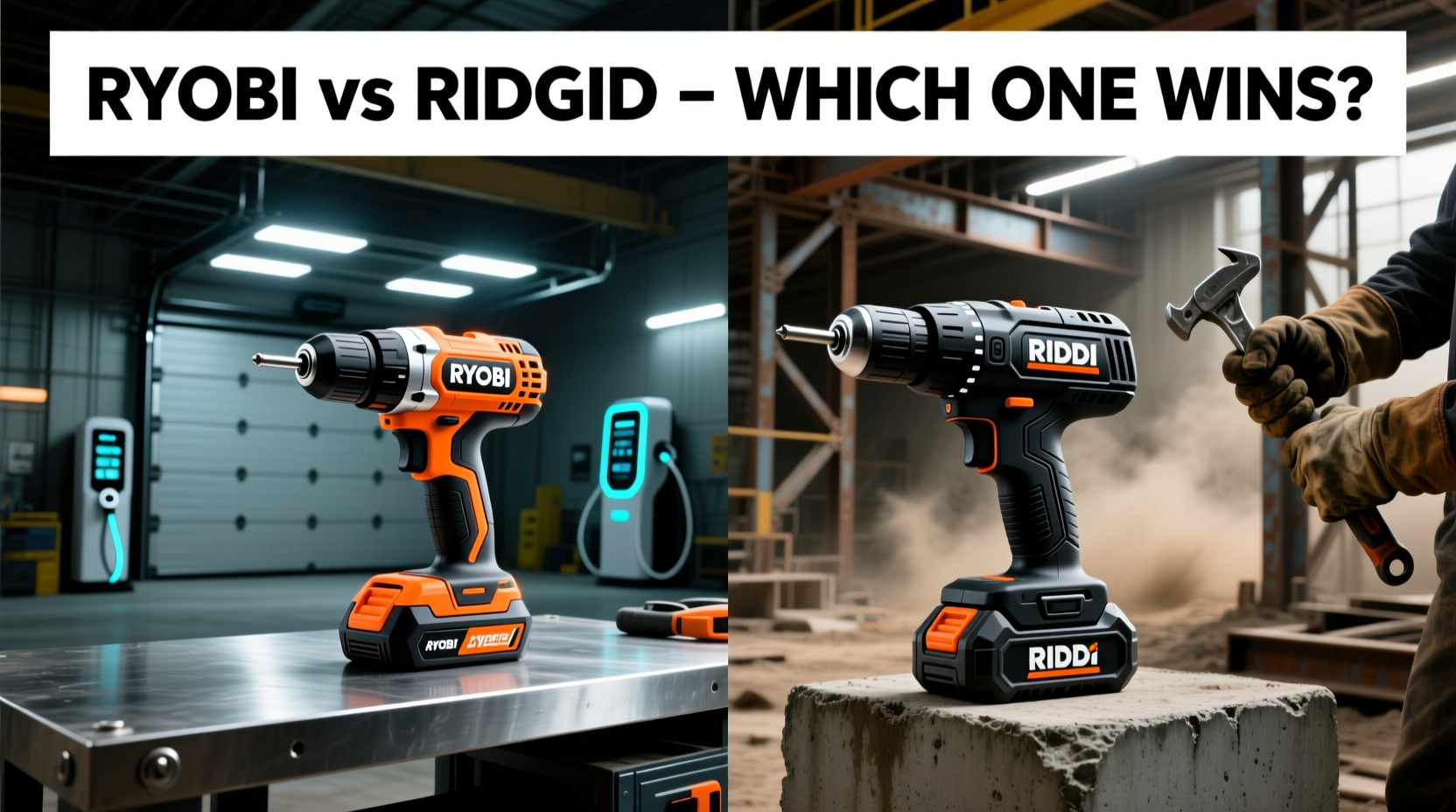Choosing between Ryobi and Ridgid isn’t just about preference—it’s about long-term investment, compatibility, and performance. Both brands dominate the mid-tier power tool market, offering cordless systems that cater to DIYers and professionals alike. But if you could only commit to one ecosystem, which should it be? The answer depends on your priorities: budget, durability, warranty, or professional use.
Ryobi, a subsidiary of Techtronic Industries (TTI), has built a reputation for affordability and accessibility. Ridgid, owned by Emerson Electric, positions itself as a rugged, pro-grade option with a lifetime warranty. On paper, they seem worlds apart. In practice, the lines blur—especially as both expand their 18V platforms. Let’s break down where each excels and who benefits most from which system.
Performance and Power: Do They Match Up?

Historically, Ridgid tools have been marketed toward tradespeople who demand high torque, longer runtimes, and consistent performance under pressure. Their brushless motors, introduced in recent years, deliver competitive power across drills, impact drivers, and saws. For example, the Ridgid Gen5X 18V brushless hammer drill produces 750 in-lbs of torque—on par with higher-end Milwaukee and DeWalt models.
Ryobi, while traditionally brushed-motor focused, has aggressively upgraded its ONE+ line with brushless technology. The Ryobi HP Brushless Drill/Driver now delivers up to 650 in-lbs, closing the gap significantly. While not quite at Ridgid’s level, it’s more than sufficient for most home projects and light-duty professional work.
In real-world testing, Ridgid tools tend to maintain cooler temperatures during extended use, thanks to better heat dissipation and robust internal components. Ryobi tools perform admirably but may throttle back under sustained load. For weekend warriors, this difference is negligible. For electricians or carpenters running hundreds of screws daily, Ridgid’s thermal management offers a tangible edge.
“Ridgid tools feel like they’re built to take a beating. I’ve dropped mine down stairwells and kept working. Ryobi’s great, but it doesn’t inspire that same confidence.” — Carlos Mendez, Master Electrician, Austin TX
Value and Affordability: Where Does Your Dollar Go?
Ryobi wins hands-down in affordability. You can build a full starter kit—drill, impact driver, circular saw, flashlight, and two 4Ah batteries—for under $200. That’s unmatched in the industry. The brand is widely available at Home Depot, Lowe’s, and Amazon, making replacements and upgrades easy and cost-effective.
Ridgid sits at a higher price point. A comparable bundle runs $300–$400. However, you're paying for premium materials, better ergonomics, and longer motor life. The cost per use over time may actually favor Ridgid if you’re using tools weekly.
The Ryobi ecosystem also boasts over 200 compatible tools, including lawn mowers, pressure washers, and even indoor air purifiers. No other brand offers that breadth at this price. Ridgid focuses strictly on core job-site tools, keeping its lineup leaner but more specialized.
Lifetime Warranty: Ridgid’s Biggest Advantage
Ridgid’s “Forever Guarantee” is a game-changer. It covers defects in material and workmanship for life—if you register the tool, they’ll repair or replace it at no cost. This includes wear items like brushes and gears, which many brands exclude. There’s no receipt requirement after registration, and service turnaround is typically under two weeks.
Ryobi offers a 3-year limited warranty—solid, but not exceptional. It requires proof of purchase and doesn’t cover normal wear. Battery warranties are 2–5 years depending on chemistry. While TTI has strong customer service, it doesn’t match the peace of mind Ridgid provides.
If you’re someone who uses tools heavily and wants zero long-term risk, Ridgid’s warranty alone might justify the premium. For casual users, Ryobi’s warranty is perfectly adequate.
Compatibility and Ecosystem Growth
| Feature | Ryobi ONE+ | Ridgid Octane / Gen5X |
|---|---|---|
| Battery Platform | 18V ONE+ (200+ tools) | 18V (90+ tools) |
| Brushless Tools Available | Yes (HP & Pro series) | Yes (Gen5X & Octane) |
| Max Battery Capacity | 6.0 Ah (Pro) | 6.0 Ah (Octane) |
| Tool-to-Tool Compatibility | Full backward compatibility | Mostly compatible; check model |
| Outdoor Equipment (mowers, blowers) | Yes | No |
Ryobi’s ecosystem is unmatched in versatility. Need a string trimmer, snow blower, or portable power station? Ryobi likely makes it—and it runs on the same battery. This simplifies ownership and reduces clutter. Ridgid sticks to construction and mechanical trades, so don’t expect yard tools or HVAC-specific gear beyond basics.
However, Ridgid’s newer Octane line integrates smart electronics—like fuel gauges and overload protection—that enhance precision and safety. Their batteries charge faster and hold voltage steadier under load, which matters when using high-draw tools like reciprocating saws or grinders.
Real-World Example: A Contractor’s Dilemma
Danielle Rivera, a general contractor in Denver, faced this decision two years ago. She needed to outfit her three-person crew with a unified tool system. Her options: go cheap with Ryobi or invest in Ridgid.
She started with Ryobi due to budget constraints. After six months, two impact drivers failed—one from water exposure on a rainy deck job, another from motor burnout. Repairs were denied due to moisture damage, despite being used under shelter. She switched to Ridgid, registering all tools immediately.
Last winter, one of her drills was left overnight in a freezing truck. The next morning, it wouldn’t start. She shipped it to Ridgid—no receipt, just her registration. It returned in nine days, fully repaired. “That warranty saved me $180 and a week of downtime,” she said. “Now I won’t buy anything without a lifetime guarantee.”
Step-by-Step: How to Choose Based on Your Needs
- Assess your usage frequency: Are you a homeowner doing seasonal projects? Ryobi is ideal. A pro logging 30+ hours a week? Lean toward Ridgid.
- Set your budget: Under $300 for a full kit? Ryobi wins. Over $500 and want longevity? Ridgid pays off.
- Check availability: Ridgid isn’t sold at Lowe’s. If you rely on local access, ensure your hardware store carries your chosen brand.
- Evaluate future needs: Will you need outdoor tools? Ryobi. High-torque demolition gear? Ridgid has stronger heavy-duty offerings.
- Test before buying: Visit a Home Depot or Toolbarn to handle both brands. Weight, grip comfort, and trigger response matter.
Frequently Asked Questions
Can I use Ryobi and Ridgid batteries interchangeably?
No. Despite both being 18V, the physical design, contacts, and communication protocols are incompatible. Adapters do not exist and are not recommended.
Is Ridgid really “pro-grade”?
Yes, increasingly so. While not as widespread on job sites as DeWalt or Milwaukee, Ridgid tools meet or exceed professional demands in durability and performance. Their adoption among union electricians and plumbers is growing.
Does Ryobi’s low price mean poor quality?
Not necessarily. For DIY use, Ryobi delivers excellent value. Quality control is consistent, and failure rates for occasional use are low. Just don’t expect the same resilience under constant stress.
Final Verdict: Which Brand Should You Pick?
If you could only choose one, the decision comes down to purpose.
Pick Ryobi if: You’re a homeowner, renter, or hobbyist who values versatility, low cost, and a wide range of tools—including outdoor equipment. Its accessibility and expanding brushless line make it the best all-around choice for non-professionals.
Pick Ridgid if: You work in construction, electrical, plumbing, or HVAC and need tools that last through daily abuse. The lifetime warranty, superior thermal performance, and professional-grade build quality justify the higher upfront cost.
There’s no universal winner. But if forced to decide, **Ridgid edges ahead for long-term reliability and peace of mind**. For those treating tools as essential work partners, not disposable gadgets, that assurance is priceless.









 浙公网安备
33010002000092号
浙公网安备
33010002000092号 浙B2-20120091-4
浙B2-20120091-4
Comments
No comments yet. Why don't you start the discussion?